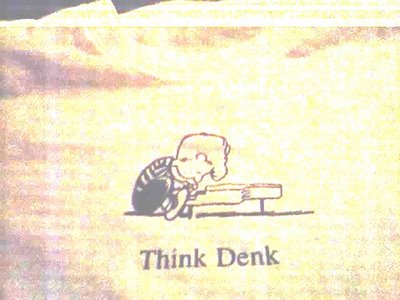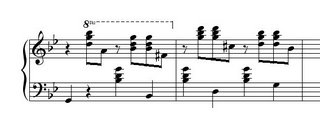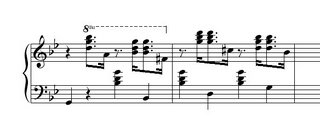Whole painstaking books vanish from my mind like dreams. I stare at their spines on my shelves and wonder what they were ever about. I completely forgot I had read Ian McEwan’s
Atonement, and I “began” to read it with enthusiasm until, about 40 pages in, familiarity overwhelmed me, dusty characters came to life, and I closed the book, smarting with an unpleasant sense of uncontrollable
deja vu: a sense of being lost in a memory labyrinth, with no bread crumbs or string. We are curiously attached to knowing the when and where of the beginnings of our memories, the origins of shreds of information (where do I know that person from?, why is this important to me? etc.), perhaps because without the labeling system, without a chronology and a cause, information and events become depressingly infinite. Infinite in the manner of Kafkesque, recursive visions. Proust asks himself a question: why is this
madeleine meaningful to me? and seven novels later he finds, more or less, an answer: an answer which simultaneously “solves” the problem of happiness.
This business of forgetting books makes me question the purpose of reading them in the first place. In order for me to really remember a book, some extraordinary thing must happen; I have to almost rewrite it within myself. The process of remembering is painstaking. The book must lurk around, by the bed, in the kitchen, floating around the floor, hanging around my feet like a pet: a friend or foe who won’t go away; it must turn up at unexpected, undesired times; it must be picked up on random, elusive, unmotivated occasions and read and reread until its cadences and turns and twists begin to separate from from the contingent, temporal crossing of the novel-from-beginning-to-end. I imagine Bach’s pupils copying out by candlelight the preludes and fugues of the Well-Tempered Clavier.
There are of course many musical works I have absorbed in this fashion, so that I could perform them now at a moment’s notice, or probably write them down with only a few mistakes on manuscript paper; these pieces have made the difficult journey from outside to inside... Come to think of it: music is constantly being copied onto the hard drive of my brain. I’m sure there are occasional “errors” of overlap--in the jargon perhaps “buffer overrun,” please correct me here--where the music gets written into the parts of my brain I use for, say, interpersonal interaction. So when a friend comes to me in a bad mood and I am trying to cheer them up, some of what I do and say is actually Op. 111, encoded, almost by accident. Because total disentanglement is impossible. I’m sure this is true: that bits of music are floating around my brain liberally, radically, and influence my behavior at all times--when I’m ordering coffee, or when I’m sticking my bankcard yet again in the ATM. Just a few days ago, I began practicing the first fugue of the Well Tempered Clavier, and I can feel now the subject and its permutations working in me, like a spider, spinning webs of remembrance which get blown apart and reconstructed; the piece is trying madly to write itself within me before I can forget. Probably the “sensible” (but ultimately stupid) part of unconscious me is trying to fight these memorable notes, whose will is so strong, to make place for other, newer, less important memories. I am walking home from the gym, in the first coolness of fall, surrounded by mangoes on carts and ladies with canes and offers for rent and bottles for sale, and in the chaos of the city street the fugue subject stays with me absolutely: at the ends of sentences, around the corner of every other thought, behind every approaching face, an incorporeal yearning friend. I ascribe the powerful will of the notes to be learned to some greatness of the notes themselves, to the composer’s skill and invention; but this is partly a copout. I have with long practice turned myself into a note vacuum and now the mechanism cannot be stopped; I am, let’s face it, a machine for absorbing music. And, like any useful or useless machine, I am for sale.
That sounded rather dreary, or negative. I do not mean to be; I was just helplessly and tangentially
following a thought. The theme of Bach which is coursing through me right now has nothing negative about it...
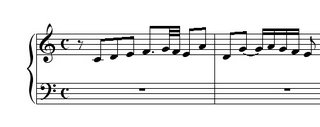
And as I sing it to myself (though without singing, actually... what is that way of thinking a phrase without singing or humming? is there a word for that? we should invent it right now...) it lifts me up, makes me feel like I am becoming... To escape its perpetual it-ness and this tension of happiness I try to account for the vector of this little constellation of notes and dip in my reservoir of words for a few sad pseudo-synonyms: “purity,” “ascent,” “balance,” “transference,” “intervallic space,” “intersecting fourths,” most too general to be meaningful at all. And when I think about Op. 111 “as a whole,” for instance, when I try to call to my mind the
idea of the piece, what is the piece?, inevitably the return of this operation includes, for example, a night when I played it in Philadelphia, and my parents locked their keys in their rental car; a certain turn of my head at a certain moment when I felt the phrase went just so; an afternoon in Beacon when the high pianissimo notes seemed to fly into the rafters, looking for the stars they seemed to symbolize; a lecture in Vermont about trenchant anomalies; a party in Bloomington; a late night of practicing it in my apartment interrupted when my mate came in to complain about me practicing so late, which ended predictably, with us making out at the piano, smashing out inadvertent clusters; a sad morning hungover in South Carolina eating barbecue at the airport, waiting desperately to either stay or go home: in other words, the piece in all its immaculate musicality and purity, in order to express itself in my brain, reaches out for bits of me (some quite impure) it can use as “words;” it reaches into the other areas of my consciousness, grabbing onto the other areas like walls it wants to climb into meaning.
I began to think about “rereading” for the silliest (and therefore most wonderful) of reasons. The other day, in my farewell to the WB channel, I referenced
King Lear, and suddenly felt like that play was way too far from me, my vision of it was too vague. In the middle of paying bills, sorting mail, vacuuming, practicing fugues, and a million annoying errands, I began to reward myself with a page at a time of Shakespeare. The horror dawned; I had made a most colossal, embarrassing error in my WB post, as of course Lear’s eyes are not plucked out, but Gloucester’s, and what kind of idiot (i.e. me) would forget that, as the meeting of the two complementary victims of fate--the now totally senile Lear and the eyeless but still lucid Gloucester--could possibly be regarded as the emotional climax of the play:
GLOUCESTER: ... Dost thou know me?
LEAR: I remember thine eyes well enough. Dost thou squint at me?
No, do thy worst, blind Cupid, I’ll not love.
Read thou this challenge, mark but the penning of it.
GLOUCESTER: Were all thy letters suns, I could not see one...
LEAR: Read.
GLOUCESTER: What? With the case of eyes?
LEAR: Oh ho, are you there with me? No eyes in your head, nor no money in your purse? Your eyes are in a heavy case, your purse in a light, yet you see how this world goes.
GLOUCESTER: I see it feelingly.
LEAR: What, art mad? A man may see how this world goes with no eyes. Look with thine ears...
The madman lectures the blind man on vision and truth. A passage that every musician should have at hand or at mind. The difficult question pokes at me: how could I have read this painful, incredible exchange, and forgotten it completely? (I feel sure I’ve read the play at least twice.) The Moment seems indelible, unforgettable ... but somehow I had not managed to write it within myself; perhaps I hadn’t looked with my ears?
The removal of Gloucester’s eyes has horror-value, of course, and also drama-value, serving as a climax proving the cruelty of Regan (until then somewhat in doubt), but its most seductive function is, I think, theme-value, or its terrifying resonance in the world of ideas (idea-value, language-value, meaning-value). To state the obvious: the literal blindness is really only the creation, in so-called reality, of Gloucester’s earlier blindness to reality, i.e. to the real nature of his two sons. It is a stripping-away; but it is the removal--we are made to understand--solely of
the appearance of sight (a beautiful paradox), of sight’s external manifestations, as punishment for a deeper truer preexisting blindness, a terrible forced coincidence of state-of-mind and state-of-body. And just when he can no longer physically see, suddenly moral sight begins to come to torment him: similar paradoxes and Catch-22s of life run off in every direction like rats in this play, as if Gloucester’s predicament were a virus of meaning that everyone must catch. Shakespeare’s unfolding of the drama, his conception of the plot, is obviously shaped and forced to include numerous “rereadings” of this blindness theme, seemingly infinite permutations where Gloucester’s condition is subject to linguistic, metaphoric, thematic play: Gloucester comes into contact with his son, but does not recognize him (“see” him); he is led to his desired suicide by this disguised son, but is tricked (once again blind, doubly blind, living in a world others create); he lives and is lectured by mad Lear, who is oddly sounding truer than ever before (what is “to see,” “to know”?); he sits on stage looking obviously at nothing while the battle rages and defeat for Cordelia and Lear results (blind injustice?); he finally learns his son’s identity and at that moment of solace dies (to see equals death). Magnificent riffs on sight and sense are everywhere:
GLOUCESTER: I have no way, and therefore want no eyes:
I stumbled when I saw. Full oft ‘tis seen
Our means secure us and our mere defects
Prove our commodities. O dear son Edgar,
The food of thy abused father’s wrath,
Might I but live to see thee in my touch,
I’d say I had eyes again.
So, one can reread
King Lear. But within the space of the play, Shakespeare is also rereading; his writing is a rereading, of an idea, a character, a node of meaning... Every time that we graze over this theme, there is a kind of resonance; some deep string is plucked again, at a frequency very different from Plot; this string crosses over the temporal order of the play, creates an atemporal order, a second plotting, a second vision, a second sight: a contrapuntal voice?
I was sitting on the stage of the Academy, playing for the second or third time through the Sarabande of the E minor Partita, when this aspect of the Partitas became very strangely and hauntingly apparent to me: tangible-ghostly. Why do ideas occur to one at a particular moment rather than another? (Why does one remember one book and not another?) It was an odd, tired moment of extenuation when the body and mind were wrung for one last drop of inspiration.
The dialogue of the various movements suddenly seemed like a process of remembering or retracing: a holding-on, like trying to find some meaning in the notes that will stick, that will not vanish. Why is this motive meaningful to me? Or perhaps: through struggle and recurrence and varied contemplation, trying to find and create a new meaning (a new “invention”), a new definition in the dictionary. And the Sarabande seems to rove farthest and dig deepest. Blah blah blah; I could reiterate what I have said here before, replucking a tired theme, throwing out yet again the Music Theory Lecture Talking Point: that the Sarabande “reworks” (all that meaning into one stupid verb) the opening motto of the Toccata. But--after all the searching for a way to say it, it does
so much more than that: it is completely woven from the earlier idea in such an extraordinary way that it seems to be grappling with it, addressing consequences, ramifications, connotations: pursuing the chain of musical metaphor.
After all, the opening idea of the piece is not really a theme (in the musical sense); it is more a Theme (in the literary sense).
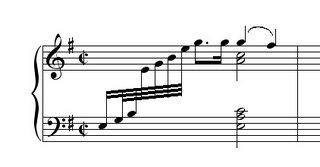
It is too universal and too brief to be Melody; it seems constantly to ask the question: what will I create? It has tendencies; it has combinative force. All but a few (exceptional) moments of the Sarabande can be understood as satellites, as Its creations. The composer does not just vary or rewrite it; he
rereads it, obsessively, like someone desperate not to forget. In the Toccata the Idea appears, paradigmatically, as a pair of discrete, marked question-and-answer phrases; or at least it is made to form them, just as Gloucester’s spiritual blindness is made to be an actual blindness (incidental, but essential). But, in the Sarabande, these binary pairs, these simple phrases, are gone, are subsumed into winding, sinuous, inescapable totality: the Idea is now read as a run-on, elusive, impossible sentence, still however rambling constantly back into its selfsame Idea. Each strange miraculous corner of this sentence is marked by this Different-but-Sameness; each chord of landing, each instance of the motive is a different event, a new “interpretation” of the idea. Sometimes the winding brings us into major keys, contradicting the tragic connotations of the Idea, creating heartbreaking paradoxical readings (“I stumbled when I saw,” “a chance which does redeem all sorrows/That I have ever felt.”). The grammar of the Idea is [dotted rhythm:dissonance:release] and Bach rereads all of these, concealing or exaggerating the dotted idea, extenuating the dissonances, transforming the releases into further dissonances. Particularly at the outset of the second half (which begins with a kind of dutiful inversion of the Idea), Bach toys with enormous expansions, almost beyond hearing, of the dissonant chords. At these moments he wanders so far afield that you barely think it is the Idea anymore (at this moment the annoying student in Music Theory class pipes up to say “do you think Bach really heard that--irritating whine here--as a variation of the main idea, aren’t you stretching things a bit?” and you give them the look of death and you wonder where they ever got the notion in their undergraduate heads to define the limits of Bach’s hearing), but you are forced to wonder anyway; he forces you towards the border where the individualized Idea (the motive, the essence) begins to melt into the total, undifferentiated possibility of all Ideas, of everything: the terrible place where the Idea could be forgotten, like so many books on my shelves.
Is this chain of readings intended simply to make us remember the Idea? Just to implant some sort of “hook”, to get us to whistle the tune, to come back for more? Of course not. The myriad readings keep leading us back to the Idea and then back out to the next reading, and on and on in an endless loop, a loop which delineates and symbolizes, I think, an attempted act of understanding: something as simple and unattainable and infinite as a human thought.
On the stage there, in my socks and not at all well-dressed, leaping around between takes like a puppy, by turns caffeinated out of my mind and fading fast, I added each take to the last and trusted/hoped the microphone would remember at least some of my meanings, some of my thoughts. I felt haunted, by a sense of Bach haunting himself, grappling personally with the material, like any other human, grappling and seeing the limits and possibilities of the Ideas he himself had created or invoked. His musical ideas were his books and he wanted to really know them, not to look at them like strangers. This vision ended on the train ride after the session, where I looked out the gray window at the impending hurricane and felt a slight fever begin to come on, dark evening, the houses with lamps depressingly distant and me passing by in the wracked train, stressed out for no reason, making nonsense of the simplest possible thing. I typed on the computer: “To recover the powerful experience, the archetypal experience, and to believe it.” And I went on about the fugue/Gigue, talking about it as if it were a book to be read:
“In the fugue subject ... melody as self-sufficient character or identity (I am what I am, take what meanings you can); then the second subject is a layer of clarification (the theme can “take comfort” from the other subject, from a bassline); the third entrance... gradually it is harder and harder to hear the theme through the density of other voices.... so the theme loses itself in its own understanding... the “miracle” that the various voices are able to coexist, the thrill of more going on than the conscious mind can simultaneously process; the constant onset of dissonances, like a kaleidoscopic grammar; the abandon of counterpoint.”
And I fell asleep and forgot everything.
